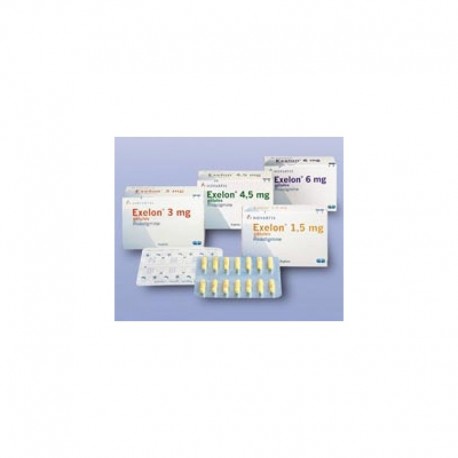No products
 View larger
View larger Exelon 4.5 Mg 28 Capsules ingredient Rivastigmine
EX8563
New product
| Quantity | Discount | You Save |
|---|---|---|
| 2 | 5% | Up to $2.99 |
| 3 | 10% | Up to $8.97 |
| 4 | 15% | Up to $17.94 |
| 5 | 20% | Up to $29.90 |
Excipients
Colloidal silica anhydrous, methylhydroxypropylcellulose 3 mPa.s, magnesium stearate, microcrystalline cellulose (fine powder), cellulose microcrystalline (granulated), red iron oxide (E172), yellow iron oxide (E172), titanium dioxide (E171)
500 Items
Volume discounts
| Quantity | Price | You Save |
|---|---|---|
| 2 | $29.90 | Up to $2.39 |
| 3 | $29.90 | Up to $7.18 |
| 4 | $29.90 | Up to $14.35 |
| 5 | $29.90 | Up to $23.92 |
More info
buy exelon online 4.5 mg for parkinson's disease no need prescription
order exelon online 4.5 mg for parkinson's disease ingredient rivastigmine low price we sell only genuine parkinson's diseaset medications not generic medicines and no prescription required
4.1. Therapeutic indications
4.2. Posology and method of administrationadministration
Posology / frequency and duration of:
Unless otherwise recommended by the doctor;
Treatment should be initiated and continued by an experienced physician in the diagnosis and treatment of Alzheimer's dementia or Parkinson's disease associated dementia. Diagnosis should be made according to the current guidelines. Rivastigmine treatment should be initiated only if the patient is responsible for monitoring the drug use regularly.
Initial dose: 1.5 mg twice daily. In patients known to be particularly sensitive to the effects of cholinergic drugs, the initial dose is 1 mg twice daily.
Dose titration: The recommended starting dose is 1.5 mg twice daily. If this dose is well tolerated after at least 2 weeks of treatment, the dose can be increased to 2 milligrams twice a day. Increasing the dose to 4.5 and 6 milligrams 2 times a day should be considered after a minimum of 2 weeks of treatment with each dose and after the patient tolerates the dose well.
If adverse events such as nausea, vomiting, abdominal pain, or loss of appetite develop or weight loss is observed, the failure to take one or more doses may eliminate them. If adverse effects persist, the daily dose should be reduced to a well tolerated previous dose.
Maintenance dose: 1.5-6 mg twice daily; In order to achieve the highest therapeutic benefit, patients should continue to use the best tolerated dose. The recommended maximal daily dose is 6 milligrams twice daily.
Maintenance therapy should be performed as long as the patient continues to benefit from therapeutic benefit. Therefore, the clinical benefits of rivastigmine should be reevaluated at regular intervals, especially in patients using a dose of less than 3 milligrams twice a day. If evidence of therapeutic effect is eliminated, discontinuation of treatment should be considered. The individual response to rivastigmine treatment is unpredictable.
Restart treatment:
4.8. Theundesirable effects
incidence and severity ofgenerally increase when the doses used rise.
If the treatment is interrupted for more than a few days, the treatment should be resumed with the lowest daily dose and adjusted as described above.
Application:
Rivastigm should be taken twice a day, morning and evening; The capsules should be swallowed as a whole, without chewing.
Additional information on special populations:
Renal / hepatic impairment:
4.3. Contraindications
Pediatric population: The
use of EXELON is not recommended for children since there is no data available on children.
Geriatric population:
4.3. Contraindications
• In the case of known hypersensitivity to Rivastigmine, other carbamate derivatives or any of the excipients contained in the formulation,
4.4. Special warnings and precautions for use
4.2. Posology and method of administration
4.8. Adverse effects
4.8. Use ofundesirable effects
EXELON should not be continued ifdo not respond to dose reduction (see section 4.8 Undesirable effects).
Like other cholinomimetics, rivastigmine may also exacerbate extrapyramidal symptoms. In patients with Parkinson's disease associated with dementia and with EXELON capsules, deterioration of Parkinson's symptoms, especially tremor, was observed.
In patients with patient sinus syndrome or conduction defects (sino-atrial block, atrio-ventricular block), care should be taken during the treatment of rivastigmine, as in the use of other cholinomimetics (see section 4.8 Undesirable effects).
Rivastigmine, like other cholinergics, may cause increased gastric acid secretion and exacerbate urinary obstruction and seizures. Care must be taken in the treatment of patients suitable for the development of these conditions.
4.5. Interactions with other medicinal products and other forms of interaction
Because of being a cholinesterase inhibitor, rivastigmine may increase the effects of succinylcholine-type muscle relaxant drugs during anesthesia.
Rivastigmine should not be used in conjunction with other cholinomimetic drugs, considering its pharmacodynamic effects, and may adversely affect the activity of anticholinergic drugs.
Studies on healthy volunteers did not show any pharmacokinetic interaction between oral rivastigmine and digoxin, warfarin, diazepam or fluoxetine. Prothrombin time prolonged by warfarin treatment is not affected by rivastigmine administration. After the combined use of digoxin and rivastigmine, no adverse effect was observed in the heart conduction system.
Rivastigmine is metabolised by drugs that are metabolised primarily by buturyl cholinesterase. The metabolism through cytochrome P450 isoenzymes is minor. Therefore, pharmacokinetic interactions with other drugs metabolized by these enzymes are not expected.
Rivastigmine; combined with commonly prescribed drugs such as antacids, antiemetics, antidiabetics, centrally acting antihypertensives, beta blockers, calcium channel blockers, inotropic drugs, antianginals, non-steroidal antiinflammatory drugs, estrogens, analgesics, benzodiazepines, and antihistamines. is not associated with an increase in undesirable effects.
Additional information onfor
specific populations No clinical interaction studies have been conductedspecific populations.

